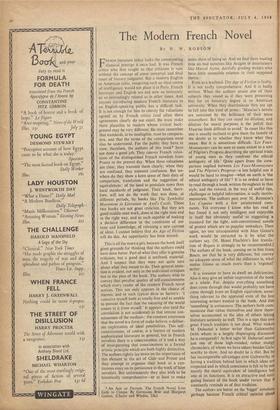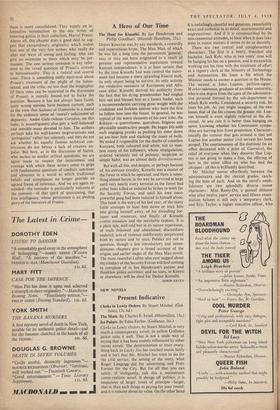The Modern French Novel
BY W. W. ROBSON
RENCH literature today lacks the commanding classical prestige it once had. It was French critics who first taught us that criticism is vain without the concept of some universal and final court of literary judgment. But a modern English or American critic, imagining such an ideal centre of intelligence, would not place it in Paris. French literature and English are not now so Intimately or so interestingly related as in other times. And anyone introducing modern French literature to an English-speaking public has a difficult task. It is not enough for him to convey the valuations agreed on by French critics (and often these agreements clearly do not exist). He must make them plausible to readers whose critical back- ground may be very different. He must remember that standards, to be intelligible, must be compara- tive, and that the terms of the comparison must also be understood. For the public they have in view, therefore, the authors of this books have not done a good job. They convey French valua- tions of the distinguished French novelists from Proust to the present day. When these valuations are clear, they transmit them clearly; when they are confused, they transmit confusion. But no- where do they show a keen sense of their duty of comparison, translation and the suggestion of equivalences : of the need to postulate more than local standards of judgment. Their book, there- fore, will not do the work that was done, at different periods, by books like The Symbolist Movement in Literature or Axel's Castle. Those two books are not great criticism. But they are good middle-man work, done at the right time and in the right way, and as such capable of making a decisive difference to the conditions of our taste and knowledge, of releasing a new current of ideas. I cannot believe that An Age of Fiction will do this. An opportunity has been missed.
This is all the more a pity because the book itself gives grounds for thinking that the authors could have done better. Part of what they offer is genuine criticism, but a good deal is textbook material. And I suspect that they were not quite sure about what they meant to do. Their general inten- tion is evident, not only in the individual critiques but in the plan of the book. The authors wish to convey that peculiar quality of self-consciousness which every reader of the modern French novel notices. This not only appears in the choice of themes, and in such typical dicta as Sartre's: `I conceive myself both as totally free and as unable to prevent the fact that the meaning of the world comes to it from myself.' It appears also (and the correlation is not accidental) in that intense con- sciousness of the medium : the constant awareness that the novel is a form of make-believe, a deliber- ate exploration of ideal possibilities. This self- consciousness, of course, is a feature of modern sophisticated literature in general, but in French novelists there is a consciousness of it and a way of incorporating that consciousness as a formal artistic principle which are both highly distinctive. The authors rightly lay stress on the importance of this element in the art of Gide and Proust and they attempt to organise their book as a con- tinuous essay on its persistence in the work of later novelists. But unfortunately they also wish to be historically comprehensive—or at least to make * AN AGE OE FICTION. The French Novel from C;ide to Camus. By Germaine Brae and. Margaret ' (Chatto and Windus, 25s.)
some show of being so. And we find them wasting time on bad novelists like Aragon or entertainers like Marcel Ayme, dutifully grading writers who have little ostensible relation to their supposed theme.
Even as a textbook The Age of Fiction is faulty. It is not really 'comprehensive. And it is badly written. When the authors praise one of their subjects they sound as if they were presenting him for an honorary degree at an American university. When they discriminate they are apt to fall into this kind of prose : `Mauriac's novels are sustained by the brilliance of their tense atmosphere. But they can stand no dilution, and dilution for moral purposes is the pitfall that Mauriac finds difficult to avoid.' In cases like this one is usually inclined to give them the benefit of the doubt as to whether they know what they mean. But it is sometimes difficult. 'Les Faux- Monnayeurs can be seen to some extent as a sort of Pilgrim's Progress describing the spiritual trials of young men as they confront the ethical ambiguity of life.' Quite apart from the com- parison implied between Les Faux-Monnayeurs and The Pilgrim's Progress—a less helpful one it would be hard to imagine—what on earth is 'the ethical ambiguity of life'? It is an ordeal to have to read through a book written throughout in that style, and the reward, in the way of useful tips, challenges or helpful information, is sadly incom- mensurate. The authors pass over M. Romains's Les Copains with a few uninterested com- ments. Yet everyone I know who has read it has found it not only intelligent and enjoyable in itself but obviously useful as suggesting a standard for the light, anti-conventional novels of protest which are so popular nowadays. Then again, no one unacquainted with Jean Giono's work would be attracted to it by what the authors say. (M. Henri Fluchere's fine transla- tion of Regain is strongly to be recommended.) The authors of the book, coming on to him from Bosco, see that he is very different, but convey no adequate sense of what the difference is, what makes Giono so much more than a 'regional' writer.
It is tiresome to have to dwell on deficiencies. Also it may give an unfair impression of the book as a whole. For, despite everything something does come through that would probably not have come through from an English equivalent, some- thing relevant to the appraisal even of the less interesting writers treated in the book. And this 'something' is seriousness. The authors both com- municate that virtue themselves and show them- selves accustomed to the idea of others taking literature seriously as well. This is a sign that one great French tradition is not dead. What makes M. Duhamel a better writer than Galsworthy (with whom in a largely disparaging discussion he is compared)? At first sight M. Duhamel seems just one of those high-minded, rather stodgy chroniclers, of whom we have others besides Gals- worthy to show. And no doubt he is that. But he has incomparable advantages over Galsworthy ill having a tradition behind him in which ideas are respected and in which conscience is felt to be not merely the moral equivalent of intelligence but one of its functions. It is an attractive and miti- gating feature of the book under review that it constantly reminds us of that tradition.
The authors are better on the 'bigger' novelists, perhaps because French critical opinion about them is more consolidated. They supply an in- formative introduction to the one writer of towering genius in their collection, Marcel Proust. Above all, this chapter does a good deal to sug- gest that extraordinary originality which makes him one of the very few writers who really do alter our ways of seeing and feeling, who can give an extension to them which may be per- manent. The one serious omission is any refer- ence to the vexed question of Proust's attitude to homosexuality. This is a radical and central issue. There is something oddly equivocal about Proust's treatment of the plight of the homo- sexual, and the critic, no less than the biographer (if these roles can be separated in the discussion of Proust), is morally bound not to burke the question. Because it has not always been faced, quite wrong notions have become current, such as the view that Sodome et Gomorrhe is a moral (in the ordinary sense of `moral') indictment of depravity. Andre Gide (whose Corydon, on this topic, is unambiguous) also gets a well-balanced and sensible essay devoted to him. The authors perhaps take his well-known tergiversations and 'ambiguities' rather too solemnly, and they do not ask whether his equally famous technical con- trivances do not betray a lack of creative im- pulse. But here, as in the discussion of Sartre, who incites to similar critical questions, we are again made to respect the incisiveness and courage with which these writers come to grips with fundamental questions of conduct, sanctions and ultimates in a world in which traditional beliefs and acceptances no longer provide an agreed frame of reference. And we are again re- minded—the reminder is particularly welcome at the moment—of that spirit of questioning, that free intelligence, whose persistence is an abiding glory of the literature of France.























































 Previous page
Previous page